人教版高中英语必修第一册Unit3 Sports and fitness SectionⅢ Discovering Useful Structures课件
文档属性
| 名称 | 人教版高中英语必修第一册Unit3 Sports and fitness SectionⅢ Discovering Useful Structures课件 | 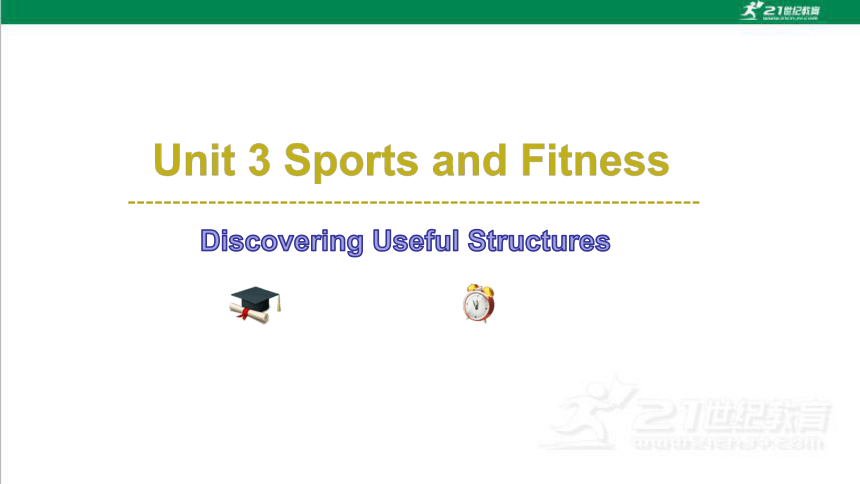 | |
| 格式 | ppt | ||
| 文件大小 | 582.5KB | ||
| 资源类型 | 试卷 | ||
| 版本资源 | 人教版(2019) | ||
| 科目 | 英语 | ||
| 更新时间 | 2025-07-16 15:32:32 | ||
图片预览

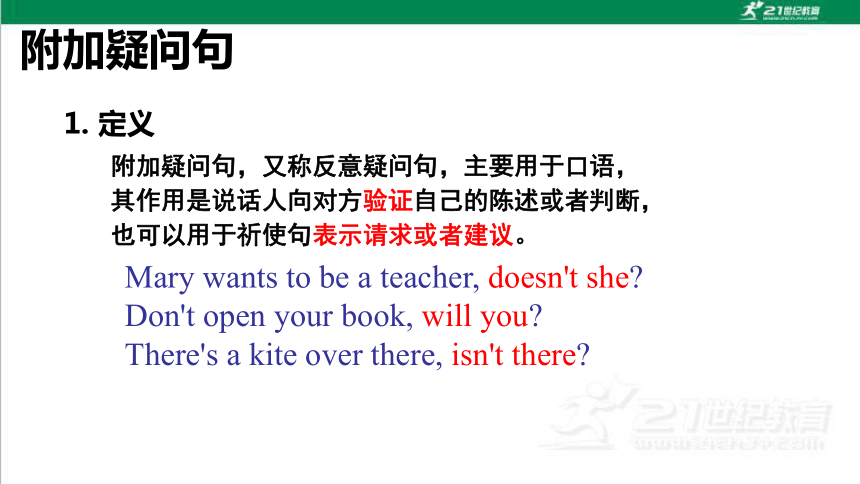
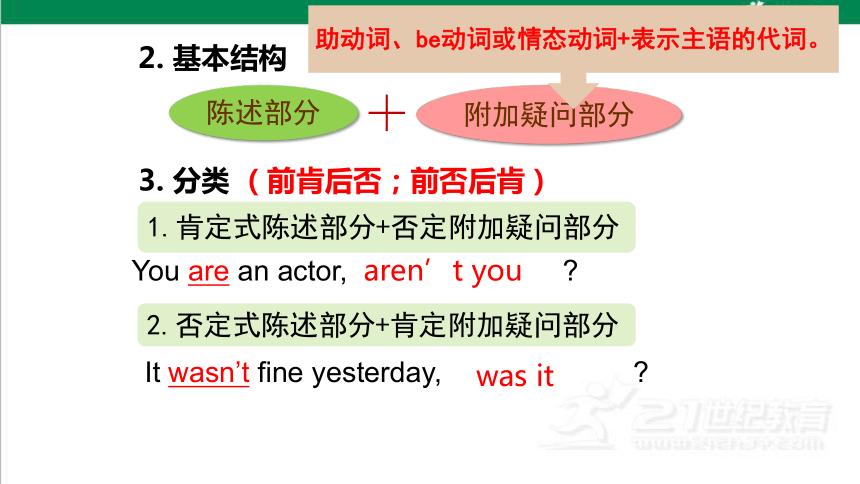
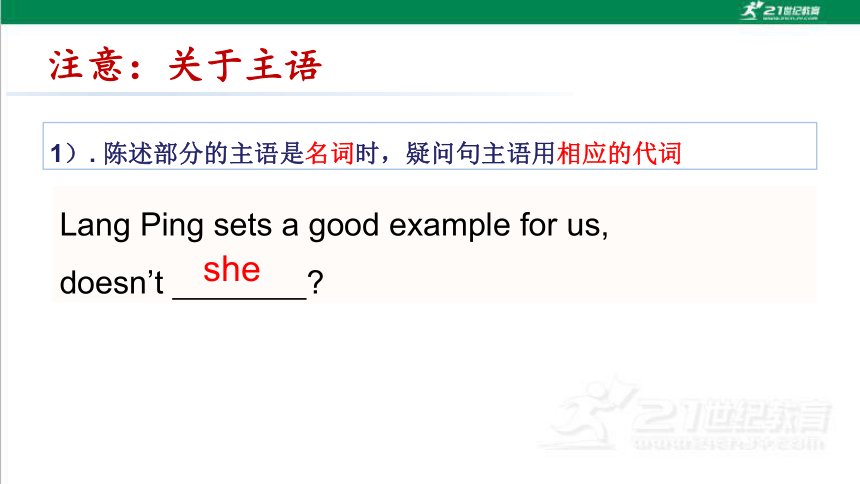
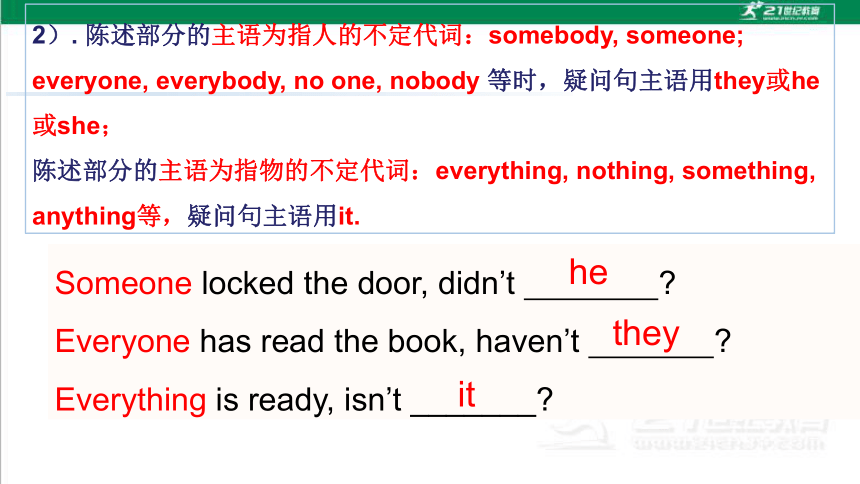
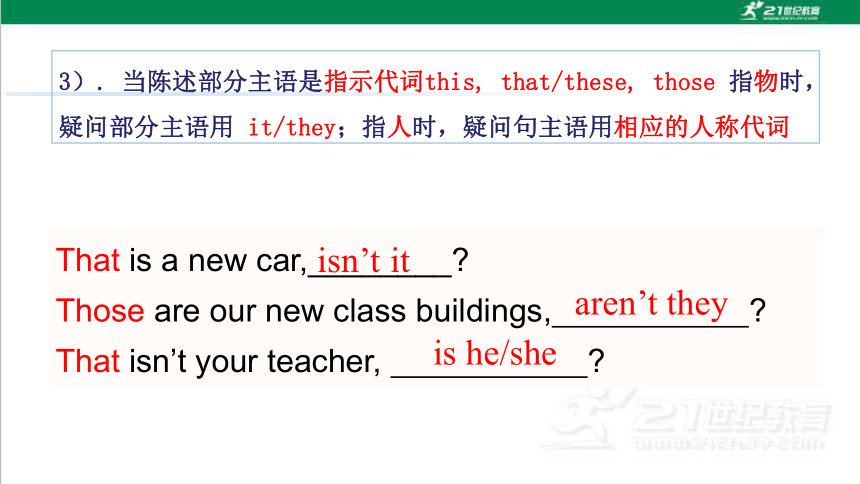
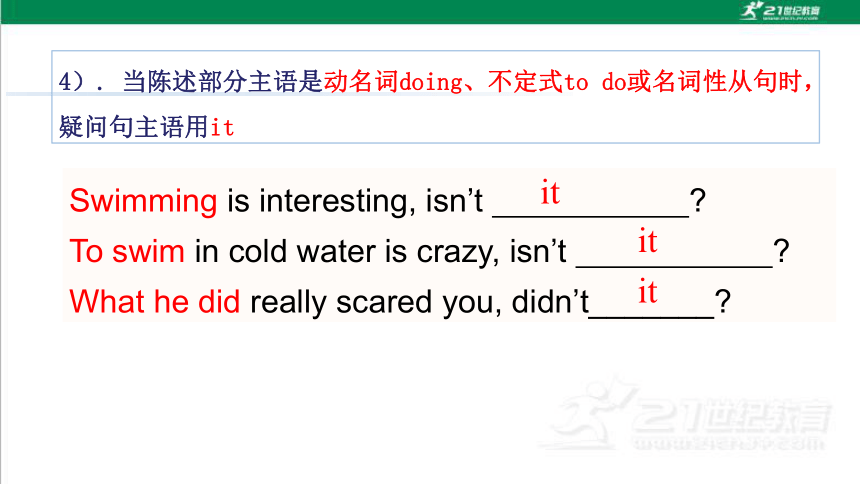
文档简介
(共18张PPT)
附加疑问句
1. 定义
附加疑问句,又称反意疑问句,主要用于口语,其作用是说话人向对方验证自己的陈述或者判断,也可以用于祈使句表示请求或者建议。
Mary wants to be a teacher, doesn't she
Don't open your book, will you
There's a kite over there, isn't there
2. 基本结构
陈述部分
附加疑问部分
助动词、be动词或情态动词+表示主语的代词。
1.肯定式陈述部分+否定附加疑问部分
3. 分类 (前肯后否;前否后肯)
You are an actor,
2.否定式陈述部分+肯定附加疑问部分
It wasn’t fine yesterday,
aren’t you
was it
1). 陈述部分的主语是名词时,疑问句主语用相应的代词
Lang Ping sets a good example for us, doesn’t
she
注意:关于主语
2). 陈述部分的主语为指人的不定代词:somebody, someone; everyone, everybody, no one, nobody 等时,疑问句主语用they或he或she;
陈述部分的主语为指物的不定代词:everything, nothing, something, anything等,疑问句主语用it.
Someone locked the door, didn’t
Everyone has read the book, haven’t
Everything is ready, isn’t _______
he
they
it
3). 当陈述部分主语是指示代词this, that/these, those 指物时,疑问部分主语用 it/they;指人时,疑问句主语用相应的人称代词
That is a new car,________
Those are our new class buildings,
That isn’t your teacher,
isn’t it
aren’t they
is he/she
4). 当陈述部分主语是动名词doing、不定式to do或名词性从句时,疑问句主语用it
Swimming is interesting, isn’t
To swim in cold water is crazy, isn’t
What he did really scared you, didn’t_______
it
it
it
5). 当陈述部分为There be结构时,附加问句主语仍用there。
There is something wrong with your watch, isn’t ____
there
6). 在suppose, guess, think, believe等后的宾语从句中,附加疑问句的部分的主语与宾语从句的主语一致。
I think it is correct, isn’t ____
it
3.陈述部分含有have/has/had+附加疑问句
陈述部分中have/has/had为助动词,构成现在完成时(have done)/过去完成时(had done);
附加疑问句:助动词(即have/has/had或者其否定形式)+主语
陈述部分中have/has/had为实义动词;
附加疑问句:have/has/had或借助助动词do/does/did.
1. You have lost some weight, _______ you
2. He has a car,____________ he
hasn’t/doesn’t
haven’t
4.情态动词+附加疑问部分
一般情况下,当陈述部分含有情态动词时,
附加疑问句:使用同样的情态动词
1. He can play the piano, _________
2. We shouldn't go right now, __________
can't he
should we
若陈述部分用must表示“必须”,疑问部分用 mustn’t 或 needn’t;
若陈述部分有mustn’t表示“禁止”时,疑问部分只用must.
We must set off early,
People mustn’t smoke here,
mustn’t / needn’t we
must they
当陈述部分含有must,can, should, may, might 表示推测时,疑问部分应根据must后的动词采用相应的动词形式 :
对现在或将来的推测(不含有过去的时间状语):haven’t /hasn’t+主语
对过去的推测(含有过去的时间状语):didn’t +主语
You must be tired,
He must have arrived now,__________ (动作完成)
He must have stayed up late last night, _________ (对过去情况的推测)
aren’t you
hasn’t he
didn’t he
基本原则:若陈述部分为祈使句,疑问部分通常用will/won’t you
3. Close the door,
4. Don’t make a noise here,
5.祈使句+附加疑问部分
①陈述句为“Let’s…”结构时,表示“让我们(你我双方)”附加问句一般用 “shall we ”
②陈述句为“Let us…” 结构时,表示“你让我们...”, 附加问句一般用 “will you ”
1. Let’s go home, _______
2. Let us go home, ________
shall we
will you
will / won’t you
will you
6.含有否定词的陈述部分+肯定附加疑问部分
陈述部分含有否定意义的词:hardly, never, nothing, few, little, no, seldom, too…to等;
附加疑问句:肯定的疑问方式
2. She has never been to Hong Kong,_________
1. Mr. Smith can hardly speak Chinese, __________
has she
can he
若陈述部分含有带否定意义,但是由否定前缀(un,im,in)组成的词
附加疑问句:否定的疑问方式
3. It is unfair,
isn’t it
7.特殊情况的附加疑问句
aren’t I
1.当陈述部分有I’m时,附加疑问部分:aren’t I
2.当陈述部分有I wish...时,附加疑问部分: may I
3.当陈述部分有had better时,附加疑问部分: hadn’t +主语。
4.当陈述部分的谓语为used to时,附加疑问部分有两种形式: usedn’t 或didn’t+主语。
1. I’m as tall as your sister, ________
2. I wish to have a word with you,_________
3. You'd better read it by yourself, ______________
4. He used to take pictures there,___________________
may I
hadn’t you
didn’t/usedn’t he
附加疑问句的回答:
回答附加疑问句的问题时,要注意根据事实真实情况回答。
具体来说:
(1)如果事实是肯定的,就用Yes回答,
(2)如果事实是否定的,就用No回答。
例:
You haven’t been to the U. S. , have you?
_______________. I want to have a visit one day.
______________. I have been there three times.
No,I haven't
Yes, I have
一、用恰当的附加疑问句完成句子。
1. She seldom goes to the cinema, __________
2. You won't be away for long,________
3. You've already got our invitation, __________
4. — Your uncle told me that he overslept.
— Oh, my uncle rarely used to oversleep,
_________
5. We never dared to ask him a question, ______
6. The old lady scarcely cares for anything,
_________
did we
does she
will you
haven't you
did he
does she
Practice
1. You never told us why you were late for the last meeting, didn't you
2. The doctor soon had the patient walking again, hadn't he
3. Everything seems all right, isn't it
4. There won’t be any concert this Saturday evening, will it
5. Let’s go shopping, will you
6. —They don’t work hard, do they
—Yes, they do. They are very lazy.
did you
didn't he
doesn't it
will there
shall we
No, they don't.
附加疑问句
1. 定义
附加疑问句,又称反意疑问句,主要用于口语,其作用是说话人向对方验证自己的陈述或者判断,也可以用于祈使句表示请求或者建议。
Mary wants to be a teacher, doesn't she
Don't open your book, will you
There's a kite over there, isn't there
2. 基本结构
陈述部分
附加疑问部分
助动词、be动词或情态动词+表示主语的代词。
1.肯定式陈述部分+否定附加疑问部分
3. 分类 (前肯后否;前否后肯)
You are an actor,
2.否定式陈述部分+肯定附加疑问部分
It wasn’t fine yesterday,
aren’t you
was it
1). 陈述部分的主语是名词时,疑问句主语用相应的代词
Lang Ping sets a good example for us, doesn’t
she
注意:关于主语
2). 陈述部分的主语为指人的不定代词:somebody, someone; everyone, everybody, no one, nobody 等时,疑问句主语用they或he或she;
陈述部分的主语为指物的不定代词:everything, nothing, something, anything等,疑问句主语用it.
Someone locked the door, didn’t
Everyone has read the book, haven’t
Everything is ready, isn’t _______
he
they
it
3). 当陈述部分主语是指示代词this, that/these, those 指物时,疑问部分主语用 it/they;指人时,疑问句主语用相应的人称代词
That is a new car,________
Those are our new class buildings,
That isn’t your teacher,
isn’t it
aren’t they
is he/she
4). 当陈述部分主语是动名词doing、不定式to do或名词性从句时,疑问句主语用it
Swimming is interesting, isn’t
To swim in cold water is crazy, isn’t
What he did really scared you, didn’t_______
it
it
it
5). 当陈述部分为There be结构时,附加问句主语仍用there。
There is something wrong with your watch, isn’t ____
there
6). 在suppose, guess, think, believe等后的宾语从句中,附加疑问句的部分的主语与宾语从句的主语一致。
I think it is correct, isn’t ____
it
3.陈述部分含有have/has/had+附加疑问句
陈述部分中have/has/had为助动词,构成现在完成时(have done)/过去完成时(had done);
附加疑问句:助动词(即have/has/had或者其否定形式)+主语
陈述部分中have/has/had为实义动词;
附加疑问句:have/has/had或借助助动词do/does/did.
1. You have lost some weight, _______ you
2. He has a car,____________ he
hasn’t/doesn’t
haven’t
4.情态动词+附加疑问部分
一般情况下,当陈述部分含有情态动词时,
附加疑问句:使用同样的情态动词
1. He can play the piano, _________
2. We shouldn't go right now, __________
can't he
should we
若陈述部分用must表示“必须”,疑问部分用 mustn’t 或 needn’t;
若陈述部分有mustn’t表示“禁止”时,疑问部分只用must.
We must set off early,
People mustn’t smoke here,
mustn’t / needn’t we
must they
当陈述部分含有must,can, should, may, might 表示推测时,疑问部分应根据must后的动词采用相应的动词形式 :
对现在或将来的推测(不含有过去的时间状语):haven’t /hasn’t+主语
对过去的推测(含有过去的时间状语):didn’t +主语
You must be tired,
He must have arrived now,__________ (动作完成)
He must have stayed up late last night, _________ (对过去情况的推测)
aren’t you
hasn’t he
didn’t he
基本原则:若陈述部分为祈使句,疑问部分通常用will/won’t you
3. Close the door,
4. Don’t make a noise here,
5.祈使句+附加疑问部分
①陈述句为“Let’s…”结构时,表示“让我们(你我双方)”附加问句一般用 “shall we ”
②陈述句为“Let us…” 结构时,表示“你让我们...”, 附加问句一般用 “will you ”
1. Let’s go home, _______
2. Let us go home, ________
shall we
will you
will / won’t you
will you
6.含有否定词的陈述部分+肯定附加疑问部分
陈述部分含有否定意义的词:hardly, never, nothing, few, little, no, seldom, too…to等;
附加疑问句:肯定的疑问方式
2. She has never been to Hong Kong,_________
1. Mr. Smith can hardly speak Chinese, __________
has she
can he
若陈述部分含有带否定意义,但是由否定前缀(un,im,in)组成的词
附加疑问句:否定的疑问方式
3. It is unfair,
isn’t it
7.特殊情况的附加疑问句
aren’t I
1.当陈述部分有I’m时,附加疑问部分:aren’t I
2.当陈述部分有I wish...时,附加疑问部分: may I
3.当陈述部分有had better时,附加疑问部分: hadn’t +主语。
4.当陈述部分的谓语为used to时,附加疑问部分有两种形式: usedn’t 或didn’t+主语。
1. I’m as tall as your sister, ________
2. I wish to have a word with you,_________
3. You'd better read it by yourself, ______________
4. He used to take pictures there,___________________
may I
hadn’t you
didn’t/usedn’t he
附加疑问句的回答:
回答附加疑问句的问题时,要注意根据事实真实情况回答。
具体来说:
(1)如果事实是肯定的,就用Yes回答,
(2)如果事实是否定的,就用No回答。
例:
You haven’t been to the U. S. , have you?
_______________. I want to have a visit one day.
______________. I have been there three times.
No,I haven't
Yes, I have
一、用恰当的附加疑问句完成句子。
1. She seldom goes to the cinema, __________
2. You won't be away for long,________
3. You've already got our invitation, __________
4. — Your uncle told me that he overslept.
— Oh, my uncle rarely used to oversleep,
_________
5. We never dared to ask him a question, ______
6. The old lady scarcely cares for anything,
_________
did we
does she
will you
haven't you
did he
does she
Practice
1. You never told us why you were late for the last meeting, didn't you
2. The doctor soon had the patient walking again, hadn't he
3. Everything seems all right, isn't it
4. There won’t be any concert this Saturday evening, will it
5. Let’s go shopping, will you
6. —They don’t work hard, do they
—Yes, they do. They are very lazy.
did you
didn't he
doesn't it
will there
shall we
No, they don't.
